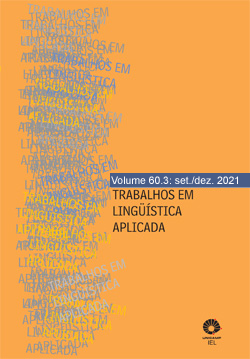Abstract
The use of Machine Translation (MT) by non-native language learners is a reality highlighted by several studies (CLIFFORD et al., 2013; ALHAISONI and ALHASYSONY, 2017; AUTHOR, 2018). Such practice provokes reactions on the part of teachers, mainly due to their concern with the process of language learning of students who use MT and with the possibility of cheating on the part of the students who may hand in to their teachers machine translations as their own productions. Hence, researches (DUCAR & SCHOCKET, 2018; HENSHAW, 2020) are being carried out aiming to find out the best way to cope with the practice of using MT in non-native language teaching and learning. The research that grounded this article has been conducted with the aim of contributing to that discussion bringing to the table the perceptions, attitudes and opinions of teachers from a Brazilian language teaching and learning context. The data have been generated by means of an online questionnaire (Google forms) applied to 12 language teachers whose answers have been tabulated, categorized, interpreted and contrasted with results of other researches with similar interests. The results show that the language instructors questioned have perceptions similar to those of the participants of researches conducted in other contexts that discussed that aspect of the question. We also found out that those teachers have flexible attitudes and favourable opinions towards the use of MT by non-native language learners and even towards the integration of MT to language teaching and learning, since there are adequate conditions.
References
ALHAISONI, Eid; ALHAYSONY, Maha. (2017). An Investigation of Saudi EFL University Students’ Attitudes towards the Use of Google Translate. International Journal of English Language Education, v. 5, n. 1, p. 72-82.
ARRIBA GARCÍA, Clara de. (1996). Introducción a la traducción pedagógica. Lenguaje y Textos, n. 8, p. 269-283.
ASQUERINO EGOSCOZÁBAL, Laura. (2015). La traducción pedagógica en la enseñanza del español como lengua extranjera a estudiantes japoneses: propuesta de unidades didácticas para trabajar algunos aspectos problemáticos de la enseñanza del verbo. Dissertação de Mestrado em Tradução, Interpretação e Estudos Interculturais. Universitat Autònoma de Barcelona, Barcelona.
BRANCO, Sinara de Oliveira. (2009). Teorias da tradução e o ensino de língua estrangeira. Horizontes de Linguística Aplicada, v. 8, n. 2, p. 185-199.
CLIFFORD, Joan; MERSCHEL, Lisa; MUNNÉ, Joan. (2013). Surveying the landscape: What is the role of machine translation in language learning? @tic. revista d’innovació educativa, n. 10, p. 108-121.
CONDE NOGUEROL, María Eugenia. (2018). Los traductores automáticos en línea como recurso metodológico en el aula de Español como lengua Extranjera. In: López-García, Camino; Manso, Jesús. (Eds.), Transforming education for a changing world. Eindhoven: Adaya Press, p. 304-312.
DUCAR, Cynthia; SCHOCKET, Deborah Houk. (2018). Machine translation and the L2 classroom: Pedagogical solutions for making peace with Google translate. Foreign Language Annals, v. 51, n. 4, p. 779-795.
GARCÍA, Ignacio. (2010). Can Machine Translation Help the Language Learner? ICT for Language Learning. Disponível em: http://conference.pixelonline.net/ICT4LL2010/common/download/Proceedings_pdf/T RAD02-Garcia.pdf Acesso em: 23 dez. 2020
HENSHAW, Florencia. (2020). Online translators in language classes: pedagogical and practical considerations. Disponível em: https://fltmag.com/online-translators-pedagogical-practical-considerations/ Acesso em: 09 jan. 2021.
KARNAL, Adriana Riess. (2015). As estratégias de leitura sem e com o uso do google tradutor. Tese de Doutorado em Linguística. Pontifícia Universidade Católica do Rio Grande do Sul, Porto Alegre.
LEE, Sangmin-Michelle. (2019). The impact of using machine translation on EFL students’ writing. Computer Assisted Language Learning, v. 33, n.3, p. 157-175.
McCARTHY, Brian. (2004). Does online machine translation spell the end of take-home translation assignments? CALL-EJ Online. v. 6, n. 1, p. 26-39.
NIÑO, Ana. (2009). Machine translation in foreign language learning: Language learners’ and tutors’ perceptions of its advantages and disadvantages. ReCALL, v. 21, n. 2, p. 241-258.
NIÑO, Ana. (2020). Exploring the use of online machine translation for independent language learning. Research in Learning Technology, v. 28, p. 1-32.
NOUATIN, Gbènoukpo Gérard. (2018). O papel do tradutor automático livre na aprendizagem de línguas estrangeiras. Dissertação de Mestrado em Estudos de Linguagens. Centro Federal de Educação Tecnológica de Minas Gerais, Belo Horizonte.
PUTRI, Gustika Dayama; HAVID, Ardi. (2015). Types of Errors Found in Google Translation: A Model of MT Evaluation. Proceedings of ISELT FBS Universitas Negeri Padang, Padang, v. 3, p. 183-188.
RORSCHACH, Elizabeth; TILLYER, Anthea; VERDI, Gail. (1992). Research on ESL composition instruction: the Fluency-first approach. In: TESOL 1992 Conference. Vancouver, B.C. Disponível em: https://files.eric.ed.gov/fulltext/ED350848.pdf . Acesso em: 09 jan. 2021
SÁNCHEZ IGLESIAS, Jorge Juan. (2009). La traducción en la enseñanza de lenguas extranjeras: una aproximación polémica. RedELE, 10. Disponível em: http://www.educacion.es/redele/Biblioteca2009/JJSanchezIglesias/Memoria.pdf Acesso em: 09 jan. 2021
SOMERS, Harold.; GASPARI, Federico.; NIÑO, Ana. (2006). Detecting inappropriate use of free online machine translation by language students – A special case of plagiarism detection. In: 11th Annual Conference of the European Association of Machine Translation. Proceedings of the 11th Annual conference of the European Association for Machine Translation. Disponível em: https://www.aclweb.org/anthology/2006.eamt-1.6.pdf Acesso em: jan. 2018.
STAPLETON, Paul; KIN, Becky. Leung Ka. (2019). Assessing the accuracy and teachers’ impressions of Google Translate: A study of primary L2 writers in Hong Kong. English for Specific Purposes, v. 56, p. 18-34.

This work is licensed under a Creative Commons Attribution 4.0 International License.
Copyright (c) 2021 Trabalhos em Linguística Aplicada


